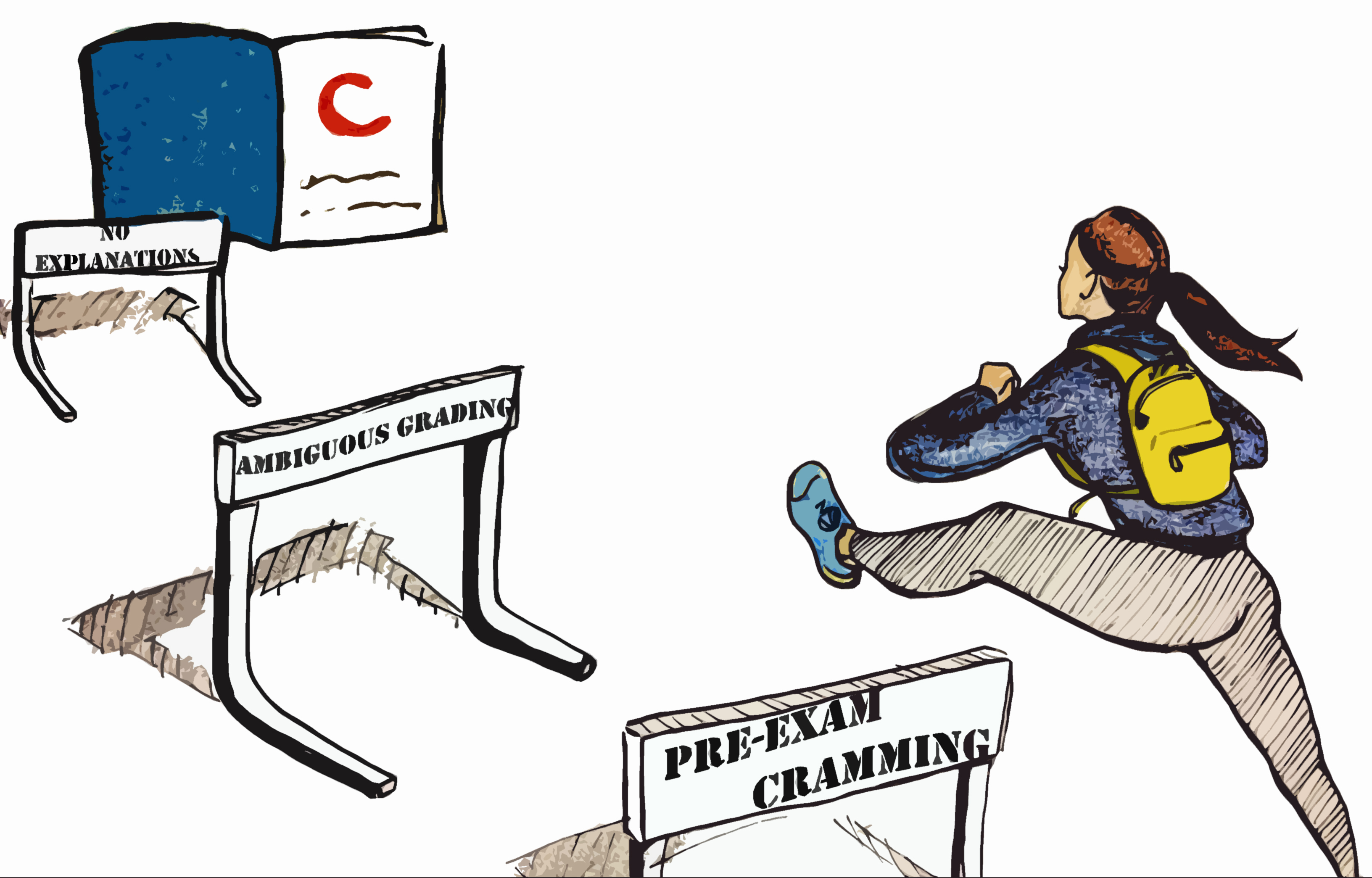Casey Kovarik: High stakes exams jeopardize student learning

(Shelby Chan/Daily Bruin)
By Casey Kovarik
May 20, 2015 12:12 a.m.
There is a need for a refocusing of undergraduate education away from grades and tests toward learning.
Education in primary school, secondary school and undergraduate programs emphasizes assessments and ranking of students to the detriment of learning. Students aren’t becoming problem-solvers and thinkers – rather, they are becoming study machines because that’s what gets them results.
Currently there is a lack of resources at many undergraduate education institutions. UCLA is a prime example of this. However, there is a need for students to signal their abilities to graduate schools and to employers through grades. The combination of these things has led to the use of a few high stakes exams to determine the grade for a whole term of work.
In many courses at UCLA, credit is not given for homework and there is a lack of frequent checks on understanding. This is improving in many classes with the increased use of clickers and common collaboration and learning environment quizzes, but still has miles to go.
While it’s hard to completely remedy this systemic problem, there are two major ways UCLA can try to fix it. One is by increasing the number of small assessments, which will in turn improve the quality of high stakes assessments and create opportunity for other projects and reports. The second is by expanding the time students can review their exams.
These changes are necessary because studies have shown that more frequent assignments and quizzes help students learn the material and retain it in the long term. It is also a good cushion for grades to take some pressure off the exams and reward students for their diligence.
Many online services such as WebAssign, Pearson and CCLE have resources for making grading easier or even doing it for the teaching assistants. All of these are hosts for content and quizzes, which makes it easy to have students frequently checking in on material. This means that students have increased opportunity to work with curriculum and get credit for it throughout the quarter, increasing long-term retention without increasing the workload on TAs.
Because of these more frequent assessments, midterms and finals can be more focused on open-ended questions. Economics adjunct assistant professor Randall Rojas said he would like to be able to give all free-response questions, with space for students to write in words that show their thought process and methods, in order to give partial credit and see what students understood and didn’t. However, he is unable to do this because there are not enough graders to handle this kind of assessment.
If there are more frequent quizzes, online midterms and finals won’t need to be as long because the content that would usually be covered in multiple choice questions will be covered in quizzes, making it possible to ask free response questions without overburdening TAs.
Also, this can allow for more open-ended projects and reports, which can enhance the quality of education without damaging the integrity of the grade.
Projects and reports are more effective at helping students understand concepts and retain them long term, said material science and engineering professor Yang Yang.
While it’s impossible to do away with multiple-choice testing entirely – we just don’t have the resources – using more frequent, online quizzes that streamline assessing basics of courses can also open up student and professor time for higher-level work, such as reports and projects.
Finally, there is exam review.
Often at UCLA, students are not allowed to review graded exams at home, and are also often limited on what they can write down when reviewing them during office hours. This is a clear example of putting assessments before learning.
Learning from one’s mistakes is crucial to becoming a better thinker and understanding course material. Some teachers do release tests or post answer keys, and those teachers say it’s obvious that’s the right thing to do for the students and they can write different tests each year.
Without test review, exams are only an assessment tool, when they could easily be a learning tool as well. It is wasteful not to review tests and use the questions already written and graded to learn from. Professors withhold tests just so they don’t have to write new questions, but it is not fair to prevent students’ learning for the professor’s ease.
Multiple-choice tests are a lower thinking form of assessment. This type of assessment encourages students to memorize bits and pieces of material and regurgitate them for the exam. This also benefits students who are better test-takers rather than students who understand the material.
The enormity of UCLA exaggerates the lack of resources and stiff competition. Many bright students are competing on every exam for the grades to get in to grad schools in their respective fields, while there aren’t enough faculty and staff to support the students, and assign and grade quality assessments of understanding.
More frequent quizzes and assignments are the foundation of creating a more beneficial classroom for students. They keep students consistently thinking about material and create space on midterms and finals to have shorter free-response tests.
Competition is inherent in grading and assessment and isn’t necessarily a bad thing because it is a motivator. Competition just can’t overtake learning.


